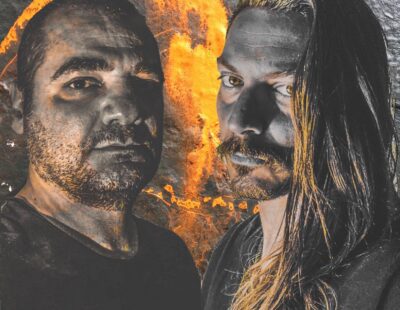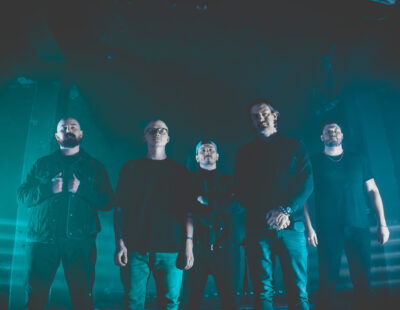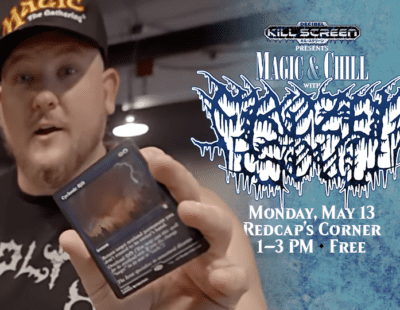
Decibel readers perhaps best know Pete Jay for stint as bassist for political grind progenitors Assück. But the project closest to his heart is blackQueen, an experimental metal and soundtrack hybrid that draws heavily on his love of horror cinema and soundtracks. The band formed in 1998 but went on hiatus when Jay relocated to Seattle to receive advanced martial arts training. The band restarted years later in Seattle and the past two years have been good ones. Jay and blackQueen were invited to play Housecore and premiered their short film “BabeGhostWitch” at the festival.
On August 1, blackQueen will release their new Billy Anderson-produced album, The Directress, which features guest appearances by musicians including Uta Plotkin, Joy Von Spain of Eye Of Nix, and Wrest of Leviathan. Jay talked to us about his love of horror soundtracks and the comeback of his passion project. We’re also streaming the title track of The Directress below – give it a spin while you read the Q and A. It will be available digitally August 1.
blackQueen was around at the turn of the century and then went away. Why did the project get shelved and how did it come back into your life?
Well, I didn’t actually shelve it. I was in San Francisco but the city started coming down hard on us. We lost our practice space. I had an offer in Seattle to go to school. I’ve trained martial arts since the early 1990s and had an opportunity to go teach and learn Wing Chun Do. At the time I decided that since we were having trouble and this was a rare opportunity I was going to go to school. My plan originally was to go back to the Bay Area but I found I really liked it here and decided to stay. That hiatus was the five or so years I spent in school and when I reached my goal I decided to go full bore back into music. BlackQueen was always my baby and I wrote all of the stuff with a lot of help and it was time for it to be reborn with a few good friends.
San Francisco is the birthplace of so many interesting music scenes and it seems so many people have been priced out of the market…that what made it special was gutted.
Being a working person in San Francisco was hard. We could record and play local shows but if you want to travel you have to pay your rent while you are gone. That can be highly expensive. With the rents rising and the practice spaces closing it was a really hard time. It became a real challenge.
When you were becoming a martial arts instructor were you playing in your down time?
I didn’t walk away from it – I was playing a lot. I always dabbled in drumming and I played drums for a band here called Wormwood; we recorded an album with Billy Anderson. There was one point when I was going to school up here that I put out two different albums with two different bands. I never took a break because if I don’t play music I start to feel the need to do it. I was very busy but when I decided to write on guitar blackQueen was what I decided to do.
Have you always been passionate about horror and horror films?
I watched Creature Feature every week as a kid – everything from Godzilla to Vincent Price movies to strange and obscure horror movies. Even though I didn’t realize it at the time the soundtracks are part of what drew me in. They had a deep root in why I love that kind of cinema and that’s always been a big part of blackQueen. There’s electronics and metal and a big influence from soundtracks.
Did you hear a lot of those soundtracks before you discovered heavy music?
A friend I knew in Florida moved to New Orleans and we traded tapes. He was sending me cassettes and VHS tapes and was the first guy to turn me on to (giallo filmmaker) Dario Argento. The films just blew me away. They’d been around for decades but I’d never seen them.
I grew up in Tampa and was going to see death metal bands and progressive metal bands. I also grew up with hardcore. As I grew up and played heavier music the soundtracks never went away.
A lot of Dario Argento films were heavily doctored. You didn’t get to see them properly until the advent of DVD.
When you watch stuff on VHS you might think it’s a crap copy. But at the same time you think it’s good until you see it 10 years later. I remember seeing a 35mm print of Suspiria in San Francisco and it seemed like a movie I’d never seen
Tell me more about the creation of this record (The Directress).
I was kind of gearing up to do something but I didn’t know it would be blackQueen again. The old blackQueen was a trio and this became a full band. We put out a seven-inch and did some tours. At some point we had an offer to play Housecore. They were very cool and listened to us despite not knowing much about us. They said we were perfect for the festival and we could play with The Melvins and Goblin and Eyehategod. I always had this video project in mind – a video that became a short film. We completed it right before we left for Housecore and I sent it to (the late festival co-founder) Corey Mitchell and he said he’d make sure it would screen because we were the only people playing who also made a movie. We played the opening night and had our film screened.
How did you end up with these guest vocalists like Wrest and Uta Plotkin for The Directress?
A lot of it was spontaneity. I knew Jef (Whitehead) through a mutual friend and he said he’d be honored (to contribute). I was blown away because I’ve been a fan of his music for a long time. He came over and brought his baby daughter and went into the room and did some of creepiest vocals I’ve ever heard. Uta was Billy’s idea. She’s a friend, too, but came over and spontaneously did some things that blew us away.
This seems like a fortuitous time to bring back blackQueen considering the renewed interest in horror soundtracks and two competing versions of Goblin.
Claudio Simonetti and I had a one-on-one conversation in a parking lot a while back! I would have never thought that could happen. But I’ve always done what I’ve done and I started again without thinking if it was pertinent. Somehow it coincided with the rebirth of horror film soundtracks, particularly in metal. You should never talk intuitive synchronicity for granted.
While talking to you I looked back and saw Misery Index on my CD rack. What you do you think of Assück’s long afterlife?
That’s another thing in my life where I didn’t think it would get to this point. There was very little grind like that, especially that was socially and politically conscious. The band kind of started as a joke. To see it now as almost a household word for grind is mind-blowing and humbling.






